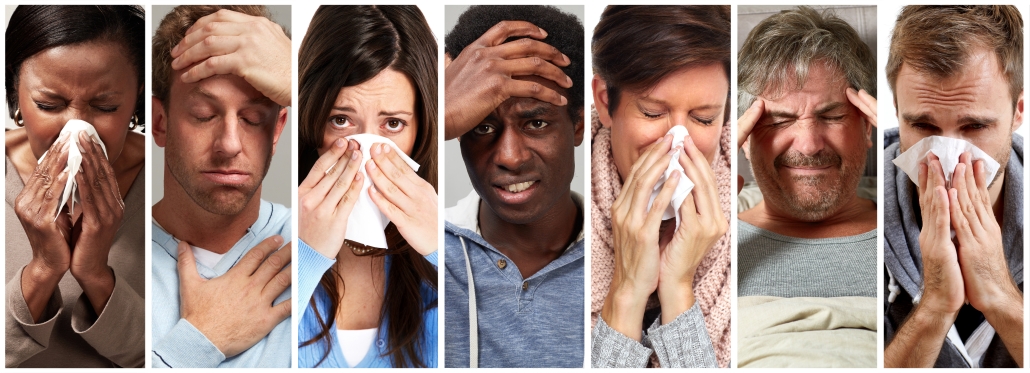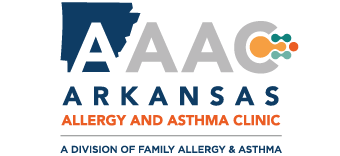Cold, Flu or Allergies: What do my symptoms mean?

It’s easy to jump to conclusions when you wake with a scratchy throat or runny nose. We’d all like to believe it’s just a cold…but it may be more. Colds, flu and allergies can seem strikingly similar, but some key differences can help us tell them apart. Understanding these differences is crucial for seeking appropriate treatment, and our providers have the knowledge to help you find relief.
The Common Cold
The common cold is a viral infection of the upper respiratory tract, primarily affecting the nose and throat. Colds are highly contagious and can be spread through airborne droplets when an infected person coughs or sneezes, direct person-to-person contact or by touching contaminated surfaces and then touching the face.
Symptoms tend to be mild and include:
- Runny or stuffy nose
- Sore throat
- Coughing and sneezing
- Mild fatigue
Colds rarely lead to serious health issues and typically resolve within a week to 10 days. Treatment focuses on symptom relief via rest, hydration and over-the-counter (OTC) medications.
The Flu
Flu is a highly contagious respiratory illness caused by influenza viruses that infect the nose, throat and sometimes the lungs. It spreads primarily through airborne droplets, similar to that of a cold. But unlike the common cold, the flu’s more severe symptoms can result in just as serious outcomes, like hospitalization. These symptoms include:
- High fever
- Chills and sweats
- Muscle aches and fatigue
- Dry cough
- Possible vomiting and diarrhea (more common in children)
Annual vaccinations are recommended as a preventive measure, and antiviral medications may be prescribed for treatment.
Allergies
Unlike colds and flu, allergies are immune system reactions to generally harmless substances that trigger an abnormal and negative bodily response. These substances, called allergens, can include pollen, dust mites, mold spores, pet dander, certain foods, and insect venom.
When an allergic person comes into contact with an allergen, their immune system perceives it as a threat and releases chemicals like histamines, leading to various allergic symptoms.
- Itchy, watery eyes
- Sneezing and runny nose with clear mucus
- Itchy throat
- Symptoms last as long as exposure to the allergen continues
While there is no “cure,” allergy management is possible through education, over-the-counter and prescription antihistamines and/or nasal sprays. Oral immunotherapy (allergy tablets) and subcutaneous immunotherapy (allergy shots) are available to patients seeking more permanent and long-term relief.
Key Differences
While colds, flu and allergies share overlapping symptoms, understanding their distinctions helps identify the best treatment path. The most common differences between the three include…
Duration: Cold symptoms resolve within a week to 10 days, but allergy symptoms persist with exposure. Flu symptoms typically pass within four to seven days, while cough and fatigue can persist for weeks.
Fever and Aches: Fever and body aches are hallmarks of the flu but rare in colds and absent in allergies.
Itchiness: Itchy eyes and throat strongly suggest allergies.
Symptom Onset: Flu symptoms tend to appear suddenly, while colds and allergies can come on gradually. If symptoms are recurring seasonally, it is most likely allergies.
When to Seek Medical Attention
Regardless of the cause, your healthcare provider can be instrumental in preventing complications and ensuring your healthy recovery. Who to contact and when will vary depending on whether you are experiencing cold, flu or allergies.
If you have a cold, seek medical advice if symptoms persist longer than 10 days or if you experience severe symptoms such as high fever, shortness of breath or chest pain, as these could indicate a more serious infection like pneumonia.
For the flu, individuals at high risk (e.g., young children, the elderly, pregnant women and those with chronic conditions) should seek medical attention at the first sign of symptoms. If flu symptoms improve but then return with a fever and worse cough, it may signal a secondary infection like bacterial pneumonia, requiring urgent care. Symptoms like difficulty breathing, persistent chest pain, sudden dizziness and severe muscle pain are also cause for immediate medical attention.
Last but certainly not least are allergies. While over-the-counter (OTC) medications may seem the simple solution, the best course of action is to consult your local allergist. These highly-trained specialists can help you identify the cause of your symptoms through allergy testing and create a custom treatment plan tailored to your unique needs.
Whenever you’re uncertain about symptoms or their management, consulting a healthcare provider is your best and safest option.
Identify your symptoms and discover allergy relief!
Let’s find a clear solution together! Arkansas Allergy and Asthma Clinic’s trusted allergy specialists are always ready to guide patients toward relief. With locations across the region, allergy relief is always close to home. Contact us today to schedule your allergy appointment.

About Arkansas Allergy and Asthma Clinic (AAAC)
Arkansas Allergy and Asthma Clinic (AAAC) is affiliated with Family Allergy & Asthma, a network of board-certified allergy and asthma specialists dedicated to providing high-quality, reliable and lasting allergy relief. AAAC serves patients in communities throughout Central Arkansas at two convenient locations in Little Rock and Conway, Ark. AAAC is also on Facebook, Instagram and X. For more information, visit arallergy.com.


